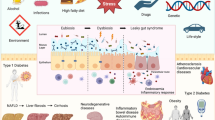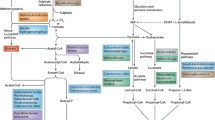Abstract
Obesity is often associated with intestinal microbiota imbalance and increased Gram-negative bacteria characterized by higher endotoxin levels. Therefore, a study on the joint effects of a high-fat diet and Gram-negative bacteria prechallenge might provide further information on the interactive effects of intestinal microbiota and obesity as well as the effects of a probiotic intervention on these processes. This study focused on the joint effects of a high-fat diet and Escherichia coli on mouse inflammatory cytokines, intestinal microbiota, hepatic pathological changes, and the alleviating capacity of probiotics (Lactobacillus plantarum, Bifidobacterium breve, and Lactobacillus fermentum). Our results showed that E. coli administration and the high-fat diet exacerbated the inflammatory syndrome by increasing the visceral fat content, the inflammatory cell infiltration, and intestinal microbiota disorder in mice. E. coli administration caused a decrease in short-chain fatty acids in mouse feces, and probiotics effectively improved this phenomenon. Compound probiotic intervention reduced LPS and IL-1β levels, while increased IL-10 levels in mice improved the degeneration and inflammatory infiltration of mouse liver cells. The intestinal microbiota showed great differences at 3 weeks and 6 weeks post-administration. High fat and E. coli alone or in combination caused intestinal microbiota disorder, with increased harmful bacteria, and the probiotics effectively improved the intestinal flora structure and increased the fecal short-chain fatty acid (SCFA) content. In conclusion, a high-fat diet and Gram-negative bacteria challenge exacerbated the inflammatory syndrome, which can be alleviated by compound probiotic intervention.









Similar content being viewed by others
References
Bene KP, Kavanaugh DW, Leclaire C, Gunning AP, MacKenzie DA, Wittmann A, Young ID, Kawasaki N, Rajnavolgyi E, Juge N (2017) Lactobacillus reuteri surface mucus adhesins upregulate inflammatory responses through interactions with innate C-type lectin receptors. Front Microbiol 8:1–16 doi:ARTN 321. https://doi.org/10.3389/fmicb.2017.00321
Borzabadi S, Oryan S, Eidi A, Aghadavod E, Kakhaki RD, Tamtaji OR, Taghizadeh M, Asemi Z (2018) The effects of probiotic supplementation on gene expression related to inflammation, insulin and lipid in patients with Parkinson’s disease: a randomized, double-blind, placebo-controlled trial. Arch Iran Med 21(7):289–295
Brahma Naudu P, Uddandrao VV, Ravindar Naik R, Suresh P, Meriga B, Begum MS, Pandiyan R, Saravanan G (2016) Ameliorative potential of gingerol: promising modulation of inflammatory factors and lipid marker enzymes expressions in HFD induced obesity in rats. Mol Cell Endocrinol 419:139–147
Cani PD, Delzenne NM (2009) Interplay between obesity and associated metabolic disorders: new insights into the gut microbiota. Curr Opin Pharmacol 9(6):737–743. https://doi.org/10.1016/j.coph.2009.06.016
Cani PD, Neyrinck AM, Fava F, Knauf C, Burcelin RG, Tuohy KM, Gibson GR, Delzenne NM (2007) Selective increases of Bifidobacteria in gut microflora improve high-fat-diet-induced diabetes in mice through a mechanism associated with endotoxaemia. Diabetologia 50(11):2374–2383. https://doi.org/10.1007/s00125-007-0791-0
Chen LH, Chen YH, Cheng KC, Chien TY, Chan CH, Tsao SP, Huang HY (2018) Antiobesity effect of Lactobacillus reuteri 263 associated with energy metabolism remodeling of white adipose tissue in high-energy-diet-fed rats. J Nutr Biochem 54:87–94. https://doi.org/10.1016/j.jnutbio.2017.11.004
Chiou YS, Lee PS, Pan MH (2018) Food bioactives and their effects on obesity-accelerated inflammatory bowel disease. J Agric Food Chem 66(4):773–779. https://doi.org/10.1021/acs.jafc.7b05854
Cox LM, Yamanishi S, Sohn J, Alekseyenko AV, Leung JM, Cho I, Kim SG, Li H, Gao Z, Mahana D, Rodriguez JGZ, Rogers AB, Robine N, Loke P, Blaser MJ (2014) Altering the intestinal microbiota during a critical developmental window has lasting metabolic consequences. Cell 158(4):705–721. https://doi.org/10.1016/j.cell.2014.05.052
Coyte KZ, Schluter J, Foster KR (2015) The ecology of the microbiome: networks, competition, and stability. Science 350(6261):663–666. https://doi.org/10.1126/science.aad2602
de La Serre CB, Ellis CL, Lee J, Hartman AL, Rutledge JC, Raybould HE (2010) Propensity to high-fat diet-induced obesity in rats is associated with changes in the gut microbiota and gut inflammation. Am J Physiol Gastrointest Liver Physiol 299(2):G440–G448. https://doi.org/10.1152/ajpgi.00098.2010
Dore J, Simren M, Buttle L, Guarner F (2013) Hot topics in gut microbiota. United European Gastroenterol J 1(5):311–318
Dosoky NS, Chen Z, Guo Y, McMillan C, Flynn CR, Davies SS (2019) Two-week administration of engineered Escherichia coli establishes persistent resistance to diet-induced obesity even without antibiotic pre-treatment. Appl Microbiol Biotechnol 103(16):6711–6723. https://doi.org/10.1007/s00253-019-09958-x
Evans JM, Morris LS, Marchesi JR (2013) The gut microbiome: the role of a virtual organ in the endocrinology of the host. J Endocrinol 218(3):R37–R47. https://doi.org/10.1530/JOE-13-0131
Everard A, Geurts L, Caesar R, Van Hul M, Matamoros S, Duparc T, Denis RG, Cochez P, Pierard F, Castel J, Bindels LB, Plovier H, Robine S, Muccioli GG, Renauld JC, Dumoutier L, Delzenne NM, Luquet S, Backhed F, Cani PD (2014) Intestinal epithelial myd88 is a sensor switching host metabolism towards obesity according to nutritional status. Nat Commun 5:5648. https://doi.org/10.1038/ncomms6648
Fan X, Zhang C, Niu S, Fan B, Gu D, Jiang K, Li R, Li S (2019) Ginsenoside Rg1 attenuates hepatic insulin resistance induced by high-fat and high-sugar by inhibiting inflammation. Eur J Pharmacol 854:247–255. https://doi.org/10.1016/j.ejphar.2019.04.027
Gao X, Jia R, Xie L, Kuang L, Feng L, Wan C (2015) Obesity in school-aged children and its correlation with gut E. coli and Bifidobacteria: a case-control study. BMC Pediatr 15(64):1–4. https://doi.org/10.1186/s12887-015-0384-x
Grohmann M, Wiede F, Dodd GT, Gurzov EN, Ooi GJ, Butt T, Rasmiena AA, Kaur S, Gulati T, Goh PK, Treloar AE, Archer S, Brown WA, Muller M, Watt MJ, Ohara O, McLean CA, Tiganis T (2018) Obesity drives STAT-1-dependent NASH and STAT-3-dependent HCC. Cell 175(5):1289–1306. https://doi.org/10.1016/j.cell.2018.09.053
Hasan AU, Ohmori K, Hashimoto T, Kamitori K, Yamaguchi F, Rahman A, Tokuda M, Kobori H (2018) PPARγ activation mitigates glucocorticoid receptor-induced excessive lipolysis in adipocytes via homeostatic crosstalk. J Cell Biochem 119(6):4627–4635. https://doi.org/10.1002/jcb.26631
Hotamisligil GS, Shargill NS, Spiegelman BM (1993) Adipose expression of tumor necrosis factor-alpha: direct role in obesity-linked insulin resistance. Science 259(5091):87–91
Ingrassia I, Leplingard A, Darfeuille-Michaud A (2005) Lactobacillus casei DN-114 001 inhibits the ability of adherent-invasive Escherichia coli isolated from Crohn’s disease patients to adhere to and to invade intestinal epithelial cells. Appl Environ Microbiol 71(6):2880–2887. https://doi.org/10.1128/aem.71.6.2880-2887.2005
Jeong JJ, Woo JY, Kim KA, Han M, Kim DH (2015) Lactobacillus pentosus var. plantarum C29 ameliorates age-dependent memory impairment in Fischer 344 rats. Lett Appl Microbiol 60(4):307–314. https://doi.org/10.1111/lam.12393
Kim DH, Kim H, Jeong D, Kang IB, Chon JW, Kim HS, Song KY, Seo KH (2017) Kefir alleviates obesity and hepatic steatosis in high-fat diet-fed mice by modulation of gut microbiota and mycobiota: targeted and untargeted community analysis with correlation of biomarkers. J Nutr Biochem 44:35–43. https://doi.org/10.1016/j.jnutbio.2017.02.014
Kuo SM (2013) The interplay between fiber and the intestinal microbiome in the inflammatory response. Adv Nutr 4(1):16–28. https://doi.org/10.3945/an.112.003046
Lee N, Shin MS, Kang YN, Park K, Maeda T, Nishioka H, Fujii H, Kang I (2016) Oligonol, a lychee fruit-derived low-molecular form of polyphenol mixture, suppresses inflammatory cytokine production from human monocytes. Hum Immunol 77(6):512–515. https://doi.org/10.1016/j.humimm.2016.04.011
Li X, Song Y, Ma X, Zhang Y, Liu X, Cheng L, Han D, Shi Y, Sun Q, Yang C, Pan B, Sun Q (2018) Lactobacillus plantarum and Lactobacillus fermentum alone or in combination regulate intestinal flora composition and systemic immunity to alleviate obesity syndrome in high-fat diet rat. Int J Food Sci Technol 53(1):137–146. https://doi.org/10.1111/ijfs.13567
Li M, Jin Y, Wang Y, Meng L, Zhang N, Sun Y, Hao J, Fu Q, Sun Q (2019a) Preparation of Bifidobacterium breve encapsulated in low methoxyl pectin beads and its effects on yogurt quality. J Dairy Sci 102(6):4832–4843. https://doi.org/10.3168/jds.2018-15597
Li T, Chen X, Huang Z, Xie W, Tong C, Bao R, Sun X, Li W, Li S (2019b) Pectin oligosaccharide from hawthorn fruit ameliorates hepatic inflammation via NF-κB inactivation in high-fat diet fed mice. J Funct Foods 57:345–350. https://doi.org/10.1016/j.jff.2019.04.027
Liu J, Yue S, Yang Z, Feng W, Meng X, Wang A, Peng C, Wang C, Yan D (2018) Oral hydroxysafflor yellow a reduces obesity in mice by modulating the gut microbiota and serum metabolism. Pharmacol Res 134:40–50. https://doi.org/10.1016/j.phrs.2018.05.012
Ma X, Hua J, Li Z (2008) Probiotics improve high fat diet-induced hepatic steatosis and insulin resistance by increasing hepatic NKT cells. J Hepatol 49(5):821–830
Mashmoul M, Azlan A, Yusof BNM, Khaza’ai H, Mohtarrudin N, Boroushaki MT (2014) Effects of saffron extract and crocin on anthropometrical, nutritional and lipid profile parameters of rats fed a high fat diet. J Funct Foods 8:180–187. https://doi.org/10.1016/j.jff.2014.03.017
Nido SA, Shituleni SA, Mengistu BM, Liu YH, Khan AZ, Gan F, Kumbhar S, Huang KH (2016) Effects of selenium-enriched probiotics on lipid metabolism, antioxidative status, histopathological lesions, and related gene expression in mice fed a high-fat diet. Biol Trace Elem Res 171(2):399–409. https://doi.org/10.1007/s12011-015-0552-8
Ramos-Molinau B, Sanchez-Alcoholado L, Cabrera-Mulero A, Lopez-Dominguez R, Carmona-Saez P, Garcia-Fuentes E, Moreno-Indias I, Tinahones FJ (2019) Gut microbiota composition is associated with the global DNA methylation pattern in obesity. Front Genet 10:1–9 doi:ARTN 613. https://doi.org/10.3389/fgene.2019.00613
Saggioro A (2004) Probiotics in the treatment of irritable bowel syndrome. J Clin Gastroenterol 38(6 Suppl):S104–S106
Servin AL (2004) Antagonistic activities of Lactobacilli and Bifidobacteria against microbial pathogens. FEMS Microbiol Rev 28(4):405–440. https://doi.org/10.1016/j.femsre.2004.01.003
Sun J, Qiao Y, Qi C, Jiang W, Xiao H, Shi Y, Le GW (2016) High-fat-diet-induced obesity is associated with decreased antiinflammatory Lactobacillus reuteri sensitive to oxidative stress in mouse Peyer’s patches. Nutrition 32(2):265–272. https://doi.org/10.1016/j.nut.2015.08.020
Takahashi Y, Sato S, Kurashima Y, Lai CY, Otsu M, Hayashi M, Yamaguchi T, Kiyono H (2017) Reciprocal inflammatory signaling between intestinal epithelial cells and adipocytes in the absence of immune cells. EBioMedicine 23:34–45. https://doi.org/10.1016/j.ebiom.2017.07.027
Torres-Castro I, Arroyo-Camarena UD, Martinez-Reyes CP, Gomez-Arauz AY, Duenas-Andrade Y, Hernandez-Ruiz J, Bejar YL, Zaga-Clavellina V, Morales-Montor J, Terrazas LI, Kzhyshkowska J, Escobedo G (2016) Human monocytes and macrophages undergo M1-type inflammatory polarization in response to high levels of glucose. Immunol Lett 176:81–89. https://doi.org/10.1016/j.imlet.2016.06.001
Turnbaugh PJ, Ley RE, Mahowald MA, Magrini V, Mardis ER, Gordon JI (2006) An obesity-associated gut microbiome with increased capacity for energy harvest. Nature 444(7122):1027–1031
Wang Y, Xie J, Li Y, Dong S, Liu H, Chen J, Wang Y, Zhao S, Zhang Y, Zhang H (2016) Probiotic Lactobacillus casei Zhang reduces pro-inflammatory cytokine production and hepatic inflammation in a rat model of acute liver failure. Eur J Nutr 55(2):821–831. https://doi.org/10.1007/s00394-015-0904-3
Wang H, Zhu YY, Wang L, Teng T, Zhou M, Wang SG, Tian YZ, Du L, Yin X-X, Sun Y (2017) Mangiferin ameliorates fatty liver via modulation of autophagy and inflammation in high-fat-diet induced mice. Biomed Pharmacother 96:328–335. https://doi.org/10.1016/j.biopha.2017.10.022
Weerapan K, Min-Sun K, Memon RA, Shigenaga JK, Moser AH, Feingold KR, Carl G (2004) Effects of infection and inflammation on lipid and lipoprotein metabolism: mechanisms and consequences to the host. J Lipid Res 45(7):1169–1196
Zhang X, Zhang M, Ho CT, Guo X, Wu Z, Weng P, Yan M, Cao J (2018) Metagenomics analysis of gut microbiota modulatory effect of green tea polyphenols by high fat diet-induced obesity mice model. J Funct Foods 46:268–277. https://doi.org/10.1016/j.jff.2018.05.003
Zhao JL, Zhao YY, Zhu WJ (2017) A high-fat, high-protein diet attenuates the negative impact of casein-induced chronic inflammation on testicular steroidogenesis and sperm parameters in adult mice. Gen Comp Endocrinol 252:48–59. https://doi.org/10.1016/j.ygcen.2017.07.013
Funding
This study was funded by the Heilongjiang Province Natural Science Foundation of China (C2016049) and the Harbin City Technology Bureau Youth Talented Person Project (RC2017QN020010).
Author information
Authors and Affiliations
Corresponding author
Ethics declarations
Animal experiments were carried out in compliance with the guidelines for the care and use of laboratory animals and the institutional ethical guidelines in China.
Conflict of interest
The authors declare that they have no conflict of interest.
Additional information
Publisher’s note
Springer Nature remains neutral with regard to jurisdictional claims in published maps and institutional affiliations.
Electronic supplementary material
ESM 1
(PDF 138 kb)
Rights and permissions
About this article
Cite this article
Sun, Q., Zhang, S., Liu, X. et al. Effects of a probiotic intervention on Escherichia coli and high-fat diet-induced intestinal microbiota imbalance. Appl Microbiol Biotechnol 104, 1243–1257 (2020). https://doi.org/10.1007/s00253-019-10304-4
Received:
Revised:
Accepted:
Published:
Issue Date:
DOI: https://doi.org/10.1007/s00253-019-10304-4




